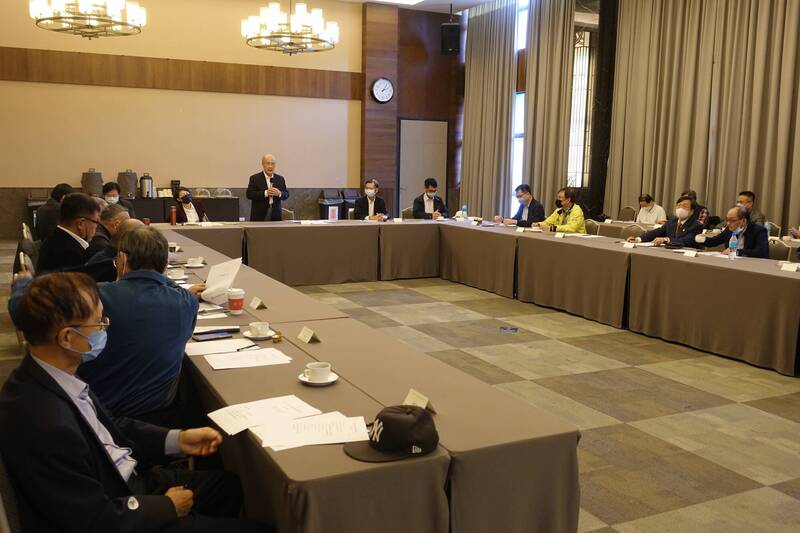The SEF pointed out that the recent rapid growth of China's supply and marketing cooperatives, coupled with the construction of community canteens, centralized control of procurement and logistics, will become a strong competitor for Taiwanese businessmen in the catering industry.
(Provided by SEF)
[Reporter Chen Yufu/Report from Taipei] After the 20th National Congress of the Communist Party of China, the two major symbols of the planned economy era, "supply and marketing cooperatives" and "state-run canteens" showed signs of full revival.
The SEF pointed out today that the recent rapid growth of China's supply and marketing cooperatives, coupled with the construction of community canteens and centralized control of procurement and logistics, will become a strong competitor for Taiwanese businessmen in the catering industry.
On December 6 and 7, the SEF held a meeting of financial and legal advisors to discuss "opportunities and challenges for backstage businessmen in the "20th National Congress of the Communist Party of China"" and "how to create a win-win situation for venture capital, start-ups, and Taiwanese investment back to Taiwan" etc. theme.
Please read on...
Most of the SEF consultants believe that China's business environment is becoming more and more severe, and Taiwanese businessmen should weigh their own competitive advantages, evaluate business strategies and adjust industrial layout, so as to quickly respond to the new situation.
Zhan Zhihong, vice chairman of the SEF, said at the meeting that the text of the report of the "Twentieth National Congress" of the Communist Party of China is a declaration of principle. To be clearer about the specific plans for next year, the SEF will continue to pay attention, and compile relevant policy trends and information for immediate reference by Taiwanese businessmen.
The report on the "Twentieth National Congress" of the Communist Party of China mentioned aspects such as common prosperity, the consolidation and development of the public sector of the economy, and the deepening of the reform of state-owned assets and state-owned enterprises.
The SEF’s introduction report suggested that Taiwanese companies must cope with internal challenges such as the slowdown of China’s economic growth, the strengthening of corporate supervision, the increase in labor wages, and the increase in operating costs caused by new taxes.
Some consultants reminded that due to the impact of the epidemic, many foreign capital and Taiwanese businessmen in China have gradually moved out and set up other production bases. Taiwanese businessmen should weigh their own physique and attributes and decide the proportion of staying in China or moving to other regions. Or further seek to enter the supply chain of state-owned enterprises or their domestic demand market.
The U.S.-China trade war and the technology war have gradually formed two standards, and companies have begun to face the challenge of "dual standards" for product specifications.
The consultant believes that listed counter companies in the manufacturing industry are more capable of responding to changes in the general environment, while small and medium-sized enterprises have relatively heavy pressure to cope with challenges.
In the past three years, China's lockdown policy has led to sluggish employment and domestic demand, which has greatly impacted Taiwanese businessmen operating in the service industry.
It is worth noting that the recent rapid growth of supply and marketing cooperatives, which have received much attention, coupled with the construction of community canteens and centralized control of procurement and logistics, will become a strong competitor for Taiwanese businessmen in catering related industries.
In terms of green and environmental issues, some consultants pointed out that the disclosure of "environmental information" is currently only a trial practice in some industries, and the scope may be expanded in the future. At that time, environmental protection will become an issue that Taiwanese businessmen cannot ignore.
Another consultant reminded that there have been many punishment cases in laws and regulations on personal data protection or data security. Taiwanese businessmen need to pay special attention to the processing of personal information of workers and the application of corporate data to avoid derivative disputes or even violate the law.
In terms of taxation, several consultants suggested that attention should be paid to the progress of the implementation of China’s inheritance tax. Once the levy starts, the scope of taxation may be extended to overseas assets, which will have a huge impact on the transfer and distribution of Taiwanese businessmen’s funds. Early attention should be paid respond.
Some consultants also suggested that the government encourages enterprises to innovate and transform, and also encourages investment in start-ups. However, individual enterprises need to make investment, the process is complicated, and they lack the expertise in risk and profit assessment. They may consider setting up a fund to assist those who intend to return to Taiwan. Investing Taiwanese businessmen find suitable strategic investment targets.
